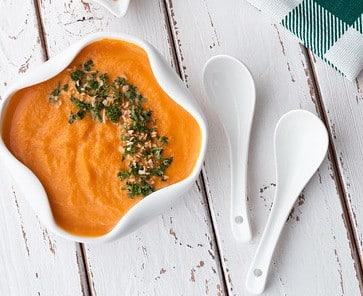The Incredible Health Benefits of Sweet Potatoes – Why You Should Incorporate Them Into Your Diet
Sweet potatoes are one of the healthiest and most nutritious vegetables available. Not only are they delicious but they also provide numerous health benefits.
These vibrant root vegetables, scientifically known as “Ipomoea batatas“, have been a staple in various cuisines for centuries. Not only they are good in taste , but also has an array of health benefits that make them a highly valuable addition to any balanced diet.
In this article, we will explore the reasons why sweet potatoes are good for you and why you should consider incorporating them into your daily meals. Incorporating them into your diet can have a positive impact on your overall health and well-being.
This article will cover the following topics:-
- What are the Benefits?
- Comparison with White Potatoes
- 2 easy to make recipes
Let us dive into the topic
What are the Benefits of Eating sweet Potatoes?
- High in essential nutrients: Sweet potatoes are packed with essential vitamins and minerals. They are an excellent source of vitamin A (in the form of beta-carotene), vitamin C, manganese, potassium, and dietary fiber. They also contain small amounts of other vitamins and minerals like vitamin B6, calcium, and iron.
- Antioxidant-rich: They are rich in antioxidants, particularly beta-carotene, which gives them their vibrant orange color. Beta-carotene converts to vitamin A in the body, and it helps protect cells from damage caused by harmful free radicals. Antioxidants can help reduce the risk of chronic diseases, including certain types of cancer and heart disease.
- Promote gut health: The fiber content in sweet potatoes promotes a healthy digestive system. Fiber adds bulk to the stool, helping prevent constipation and promoting regular bowel movements. It also acts as a prebiotic, providing nourishment to beneficial gut bacteria and supporting a healthy gut microbiome.
- Blood sugar regulation: Despite their natural sweetness, sweet potatoes have a lower glycemic index compared to regular potatoes. This means they release sugar into the bloodstream more slowly, preventing sharp spikes in blood sugar levels. Additionally, the fiber content in them can help regulate blood sugar levels and improve insulin sensitivity
- Heart health: Sweet potatoes are beneficial for heart health due to their fiber content, potassium, and antioxidants. The fiber helps lower cholesterol levels, while potassium promotes healthy blood pressure by counteracting the effects of sodium. The antioxidants in them also help reduce inflammation and oxidative stress, contributing to cardiovascular health.
- Weight management: Sweet potatoes can be a valuable addition to a weight management plan. They are relatively low in calories, yet high in fiber and nutrients, making them a satisfying food choice. They reduces cholesterol. The fiber helps promote feelings of fullness, reducing the likelihood of overeating.
- Versatility and culinary uses: Sweet potatoes are versatile and can be used in various dishes. They can be baked, boiled, steamed, roasted, or mashed. Their natural sweetness adds flavor to both sweet and savory recipes, making them a nutritious and tasty ingredient in a wide range of dishes.
Comparison of White potatoes with Sweet Potatoes
| 1 White Potato | 1 Sweet Potato | |
| Calories | 160 | 105 |
| Carbohydrates | 36 grams | 24 grams |
| Glycemix index | High | Low |
| Vitamin A | Low | High |
From above, it is clear that sweet potatoes are better than White Potatoes.
Recipes
Whether you’re looking for vegan recipes, healthy recipes, or just delicious recipes with sweet potatoes to incorporate this root vegetable into your diet, there’s something here for everyone. We can also eat them Raw. However, we can make many delicious recipes out of them.
From savory dishes to sweet treats, let’s explore some tasty ways to add sweet potatoes to your meals.
1. Mashed Sweet Potatoes

Ingredients:-
5 medium size Sweet potatoes
½ cup Milk,
1/ 2 cup butter and
¾ cup Maple syrup
Process:-
Boil sweet potatoes till it becomes soft. Mash potatoes with a potato masher. Mix it in 1/2 cup warm milk at a time until desired consistency is reached. Stir in butter and maple syrup until well blended and the butter is melted. Serve warm.
2. Roasted Sweet Potatoes

Ingredients:-
5 medium-sized sweet potatoes peeled and cut into small pieces.
½ cup olive oil
2 tablespoon rock salt
½ teaspoon black pepper powder
Process:-
Firstly, Preheat oven to 450°. Toss potatoes, oil, salt, and pepper on a rimmed baking sheet. Roast properly by tossing occasionally, until tender and brown. The estimated time for roasting is about 35–45 minutes.
How To Tell If A Sweet Potato Is Bad?
like any perishable food item, sweet potaotes can spoil if not stored properly. It is important to be aware of the signs of spoilage in sweet potatoes to ensure you are consuming them at their peak freshness and avoiding any potential health risks.
One of the most obvious signs of spoilage in sweet potatoes is a rotten or moldy appearance. If you notice any black spots or fuzzy patches on the skin, it is best to discard the sweet potato immediately. Mold growth can indicate the presence of harmful bacteria or fungi, which can pose serious health hazards if consumed.
In addition to visual cues, smell can also be a reliable indicator of spoilage. If your sweet potato emits an unpleasant odor that is different from its normal earthy scent, it may be an indication that it has gone bad. A strong, foul smell could suggest bacterial growth or decomposition.
When handling sweet potatoes, it is essential to check for any soft spots or excessive bruising as well. These physical changes can occur as a result of internal decay and should be considered as warning signs.
To keep your sweet potatoes fresh for longer periods, store them in a cool and dark place such as a pantry or cellar. Avoid storing them near sources of heat or moisture as this can accelerate their deterioration process.
You should not eat sweet potato if it is oozing, soft, discolored and smelly or have sprouts.
By being vigilant and paying attention to these signs, you can ensure that you always enjoy the finest quality sweet potatoes while safeguarding your health.
Here are few things that you want to keep in mind
- Choose small to medium-sized firm sweet potatoes with smooth skin and no bruises or cracks.
- If you lack in time, you can look for frozen sweet potato cubes which are already peeled and diced, making it easy to add to various recipes like soups and stews.
- The healthiest way to eat sweet potato is by boiling them as it retains beta-carotene and keep the nutrients. Baking or frying will lose some of the nutrients from it.
- Always leave the skin as it is. Do not peel the skin as the too have nutritional benefits.
Takeaway
Sweet potatoes are a great source of nutrition and can be an incredibly beneficial addition to your diet. Not only are they packed with vitamins, minerals, and antioxidants, but they also have a variety of health benefits that can help you improve your overall health. Whether roasted, mashed, or baked, sweet potatoes offer a sweet and nutritious addition to any meal. So, embrace the sweet truth and savor the goodness of sweet potatoes for a healthier and happier you!
Please let me know how these recipes turn out for you in the comments. I’m always so eager to hear from you.
ALSO SEE


Fantastic article! I love the in-depth exploration of sweet potatoes’ health benefits, from their rich nutrient profile to their role in promoting gut and heart health. The comparison with white potatoes is a helpful touch, and the provided recipes add a practical, delicious element. The section on identifying spoiled sweet potatoes is crucial information, and the concluding tips offer practical advice for incorporating this nutritious vegetable into our diets. A well-rounded and informative read that encourages embracing the sweet truth for a healthier, happier life!
Thank you for the lovely feedback.